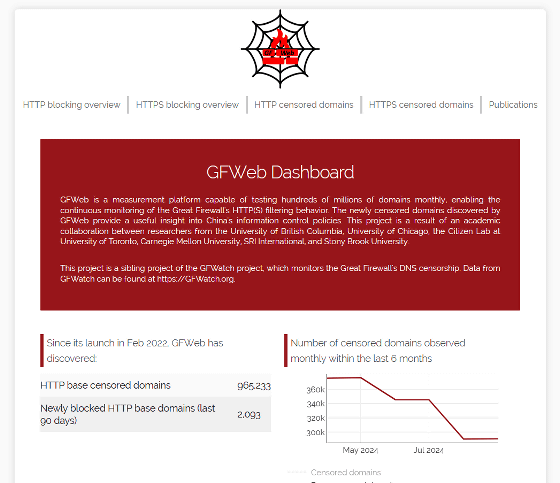'GFWeb', which tracks China's 'Golden Shield', has been released and it has become clear when AI sites such as ChatGPT have been censored

The Chinese government operates a national censorship system called
GFWeb Dashboard
https://gfweb.ca/

GFWeb: Measuring the Great Firewall's Web Censorship at Scale | USENIX
https://www.usenix.org/conference/usenixsecurity24/presentation/hoang
A new tool tracks when the Chinese government blocks websites like ChatGPT - Rest of World
https://restofworld.org/2024/when-china-blocked-ai-sites/
The Great Firewall is constantly adjusting its filtering capabilities, and analyzing which websites it blocks can help us understand the policies and attitudes of the Chinese government. However, it has been difficult to know exactly when Chinese authorities blocked specific domains, as the only way to know for sure was for individual researchers to continually test specific domains.
So, with funding from the Open Technology Fund , a nonprofit organization that supports research projects on online censorship and surveillance, a platform called GFWeb was built to track hundreds of millions of domains each month and determine whether they were blocked by the Great Firewall.
GFWeb is being built with the cooperation of researchers from the University of British Columbia, the University of Chicago, Citizen Lab based at the University of Toronto, Carnegie Mellon University, SRI International , Stony Brook University, and others. GFWeb is already available to the public for free, and you can check some of the information compiled by the platform, as well as obtain raw data from Google Drive .
According to GFWeb, at the time of writing, the Great Firewall blocks 965,233 HTTP-based domains. The most recent domains to be blocked are the music distribution service Deezer's domain ' deezer.com ' from August 3, 2024, and the decentralized SNS Bluesky's domain ' bsky.app ' from June 15, 2024.
In addition, when categorizing the domains that have been censored in the past three months by category, the top category is 'adult content,' followed by 'file sharing/storage.' Categories such as 'business,' 'gambling,' 'news/media,' and 'entertainment' are also blocked.

'GFWeb will not only enhance our ability to track the timing and scope of censorship events, but also help us identify patterns and shifts in the strategies employed by the Great Firewall. We hope that GFWeb will give researchers, policymakers, and the public greater insight into the evolving landscape of censorship in China,' Nguyen Phong Hoang of the University of British Columbia, one of the developers of GFWeb, told Rest of World.
In fact, Rest of World investigated using GFWeb and found that Chinese authorities blocked ChatGPT's domain on March 2, 2023, and machine learning platform Hugging Face was also blocked on May 7 of the same year. Hugging Face reported the issue of its domain being blocked in China in October 2023, but the exact time of the block was unknown until now.
GFWeb's investigation also revealed that Chinese authorities are actively censoring content-generating AI tools. The chart below shows AI-related websites blocked by Chinese authorities, with the horizontal axis showing the period from December 2022 to June 2024. Orange is AI tools, dark blue is ChatGPT, light blue is AI tools that are alternatives to ChatGPT, light purple is ChatGPT mirror sites, green is Hugging Face, and pink is religious AI tools.

Rest of World's analysis found that China's blocking of AI-related websites correlates with important events such as the passage of new AI regulations. For example, in spring 2024, hundreds of religion-related AI websites, such as 'Biblechat.ai' and 'Church.ai,' were blocked, coinciding with a surge in spiritual AI applications .
'This shows that the Chinese Communist Party is very sensitive to content-generation platforms that the government doesn't control, which is a major threat to them,' said Jeffrey Ding, an assistant professor of political science at George Washington University. 'Blocking AI sites might not prevent developers from using VPNs to access these tools, but it will make it harder for average Chinese people to use AI to generate politically sensitive content, such as videos mocking Chinese Communist Party leaders or writing about corruption in China.'
Charlie Smith, co-founder of GreatFire.org , which provides tools to analyze and circumvent China's Internet censorship, argues that GFWeb offers exciting possibilities for researchers. 'Knowing the exact dates of censorship is useful for a variety of reasons. For example, we can identify whether a website was blocked before or after a particular event. It can also help show how authorities are blocking websites. Are they blocking mainly on Mondays? Or on weekends? This can help us identify whether authorities are blocking websites according to a pattern,' he said.
Related Posts:
in Web Service, Posted by log1h_ik







